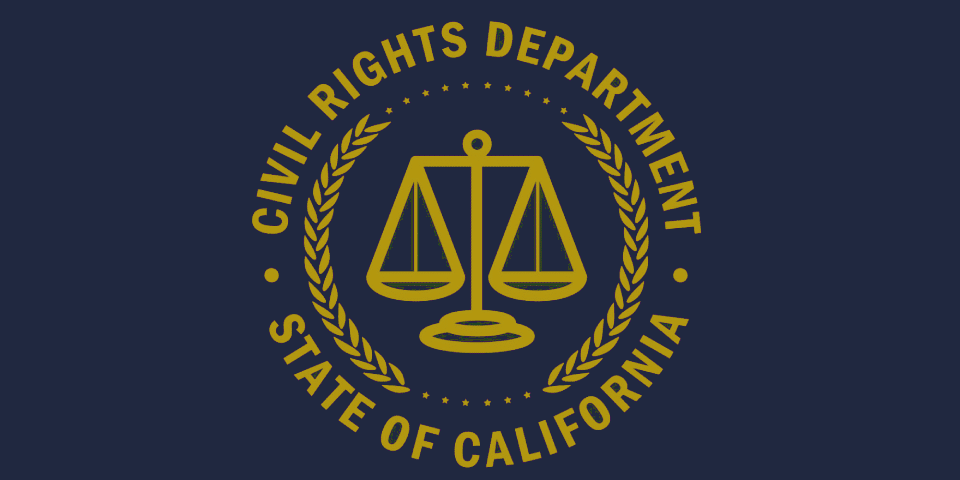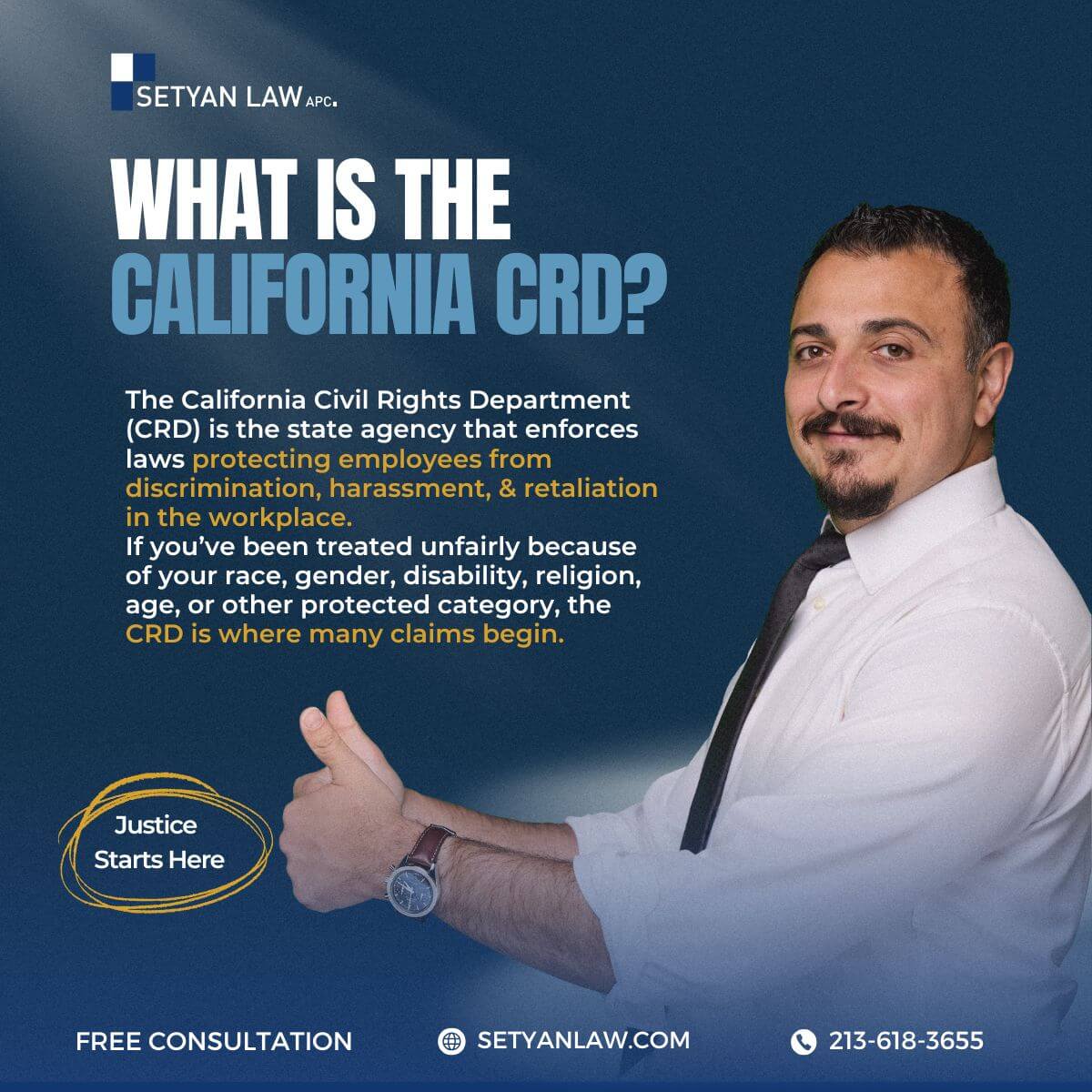Updated September 29, 2025
California Civil Rights Department (CRD—Formerly the DFEH)
The California Civil Rights Department (CRD) is the state agency charged with enforcing California's civil rights laws [1][2][2]. It protects Californians from unlawful discrimination in employment, housing, businesses, public accommodations, and state-funded programs, as well as from bias-motivated violence and human trafficking [1][2][3]. Formerly known as the Department of Fair Employment and Housing (DFEH), it represents the institutional centerpiece of California's commitment to civil rights [2].
As the largest state civil rights agency in the United States [2][3], the CRD investigates thousands of complaints annually [2][4]. The department helps secure settlements in hundreds of cases each year and, when appropriate, files lawsuits in court to protect civil rights [2][4]. Its enforcement authority spans multiple domains, including professional relationships, government contracting, and equal pay matters [5].
The department maintains a comprehensive structure to fulfill its mission. The CRD operates with 201-500 employees [5] and maintains five offices and five educational clinics throughout California [2]. A director appointed by the governor heads the department, which currently falls under the California Business, Consumer Services, and Housing Agency [2]. Since 2013, the CRD has housed the Civil Rights Council, a body that issues regulations to ensure fair interpretation and implementation of laws enforced by the department [2].
Beyond investigation and enforcement, the CRD conducts extensive outreach and education initiatives to ensure Californians understand their rights and responsibilities. The department provides free conflict resolution services to communities through its Dispute Resolution Division established in 2013 [2]. Additionally, it collects and analyzes pay data from tens of thousands of employers to identify and reduce sex and race-based pay disparities [2][4].
The CRD also operates specialized programs addressing specific civil rights concerns. These include a fair housing testing program and the California vs. Hate Resource Line and Network, which provides services to those targeted by hate [2][4]. Since 2022, the department has housed the Commission on the State of Hate, which monitors trends in hate activity, conducts research, increases public awareness through forums and collaborations, and makes recommendations on preventing and responding to hate activity [2].
For individuals experiencing civil rights violations, the CRD offers a structured complaint process. This formal grievance system allows individuals to file complaints regarding discrimination, harassment, or retaliation, particularly under the Fair Employment and Housing Act (FEHA) [6].
How did the CRD evolve over time?
The origins of California's civil rights enforcement date back to 1959 when the state established the Fair Employment Practices Commission (FEPC) to implement California's first statewide protections against workplace discrimination [3][4]. This marked a significant milestone as California became one of the first states to enact formal protections against employment discrimination based on race, religious creed, color, national origin, and ancestry [4].
A parallel development occurred during this period with the passage of the Unruh Civil Rights Act of 1959, which protected residents from discrimination by businesses, including housing providers [7]. Furthermore, in 1963, the state legislature enacted the Rumford Fair Housing Act, prohibiting housing discrimination in rental properties of four or more units [4][7].
A major restructuring occurred in 1980 when Governor Jerry Brown and the Legislature reorganized civil rights enforcement. The Fair Employment Practices Act of 1959 and the Rumford Fair Housing Act of 1963 were combined and renamed the Fair Employment and Housing Act (FEHA) [3][4]. Accordingly, the Fair Employment Practices Commission became a department-level agency called the Department of Fair Employment and Housing (DFEH) to enforce these consolidated laws [3].
Throughout the decades, the FEHA has redressed civil rights violations faced by hundreds of thousands of Californians [4]. The act has prompted numerous employers and housing providers to revise their business practices, creating a more equitable environment for all Californians [4].
In 2012, another significant evolution occurred when Governor Jerry Brown signed Senate Bill 1038, transforming the role of the department and the enforcement of FEHA [4]. Subsequently, in 2013, the department established the Civil Rights Council (formerly the Fair Employment and Housing Council), a body that issues regulations to ensure fair implementation of laws enforced by the department [3]. That same year, the Dispute Resolution Division was created to provide free, out-of-court mediation services [3].
The most recent transformation came in July 2022, when the Department of Fair Employment and Housing was renamed the California Civil Rights Department [3][4]. This change more accurately reflected the department's broadening responsibilities, which had expanded beyond employment and housing to include enforcement of laws prohibiting hate violence, human trafficking, discrimination in business establishments, and discrimination in government-funded programs [3][2].
In 2022, the department also began housing the Commission on the State of Hate, which monitors trends in hate activity, conducts research, increases public awareness, and makes recommendations for preventing and responding to hate incidents [3].
What laws does the CRD enforce?
The California Civil Rights Department enforces multiple civil rights laws that collectively protect Californians from discrimination across various domains. These laws form the foundation of the department's regulatory authority and enforcement actions.
Fair Employment and Housing Act (FEHA)
The Fair Employment and Housing Act stands as California's primary anti-discrimination law. FEHA applies to public and private employers, labor organizations, and employment agencies. It prohibits discrimination against job applicants and employees based on protected characteristics in workplaces with five or more employees [8]. FEHA protections extend to employment, housing, and public accommodations. In employment specifically, the law prohibits discrimination based on age (40+), ancestry, color, religious creed, disability (mental and physical), gender identity, genetic information, marital status, medical condition, national origin, race, sex, and sexual orientation [2]. For housing, FEHA protects against discrimination due to race, religion, sex, marital status, source of income, disability, and other characteristics [8]. Moreover, FEHA prohibits workplace harassment even in establishments with only one employee [8].
Unruh Civil Rights Act
The Unruh Civil Rights Act requires "full and equal accommodations, advantages, facilities, privileges or services in all business establishments" [9]. Enacted in 1959, this law prohibits discrimination by businesses based on protected characteristics [10]. It applies to various establishments including hotels, restaurants, theaters, hospitals, retail stores, and housing accommodations [9]. Violations might include charging different prices based on protected characteristics, refusing service, or promoting discriminatory business practices like "ladies night" discounts [9].
Ralph Civil Rights Act
The Ralph Civil Rights Act of 1976 guarantees protection from violence or threats of violence motivated by a person's actual or perceived protected characteristics [2]. Specifically, it prohibits hate-motivated violence or intimidation based on sex, race, color, religion, ancestry, national origin, disability, medical condition, genetic information, marital status, or sexual orientation [11]. Victims may receive compensation including a civil penalty of $25,000, damages for medical expenses, lost wages, and attorney fees [11]. The filing deadline is one year after learning the perpetrator's identity [11].
Disabled Persons Act
The Disabled Persons Act ensures individuals with disabilities have full and equal access to public accommodations, medical facilities, transportation, schools, and lodging places [2]. This act complements FEHA by specifically focusing on accessibility rights. Protected under this law are individuals with mental or physical impairments that limit major life activities [8]. Consequently, housing providers must allow reasonable accommodations and modifications that are necessary for equal opportunity to use and enjoy housing [8].
What is the structure and authority of the CRD?
As California's premier civil rights enforcement entity, the California Civil Rights Department operates with a comprehensive organizational structure supporting its wide-ranging authority. Currently, the department functions under the California Business, Consumer Services, and Housing Agency, though it will transfer to the California Housing and Homelessness Agency in 2026 [2].
The CRD operates throughout the state with offices in Sacramento (headquarters), Fremont, Fresno, Bakersfield, Los Angeles [2], Elk Grove, Oakland, and Riverside [12]. In 2023, the department maintained approximately 315 positions and operated with an annual budget of approximately $67 million [12].
Leadership begins with a director appointed by the governor of California [2]. The department's operational framework consists of several specialized divisions:
- Enforcement Division – receives, investigates, and conciliates complaints of civil rights violations
- Legal Division – investigates and prosecutes civil actions, including systemic discrimination cases
- Dispute Resolution Division – provides free voluntary and mandatory mediation services
- Executive Programs Division – handles legislative affairs, public outreach, and internal training
- Administrative Division – manages human resources, contracting, and procurement
- Information Technology Services Division – maintains technological infrastructure and data collection systems [12]
The CRD possesses broad statutory authority to enforce civil rights laws. This includes powers to investigate employment discrimination charges, mediate disputes, file employment lawsuits, issue publications, monitor contractor anti-discrimination programs, and prosecute civil rights violations [13].
Beyond basic enforcement, the CRD houses two important regulatory bodies. First, the Civil Rights Council issues regulations ensuring fair interpretation and implementation of laws under CRD jurisdiction [14]. Second, the Commission on the State of Hate monitors hate activity trends, conducts research, and makes prevention recommendations [14].
The department's authority extends to obtaining reasonable attorney's fees and costs, including expert witness fees, when successful in litigation [7]. These fees support departmental operations alongside legislative funding. Notably, a 2017 legislative change (Senate Bill 1038) modernized operations, allowing the CRD to file cases directly in Superior Court while requiring mandatory dispute resolution before litigation [7].
How does the CRD handle complaints and lawsuits?
The California Civil Rights Department implements a structured process for addressing civil rights violations through formal complaints and legal actions. Individuals seeking redress must navigate specific procedures established by state regulations.
Filing a complaint
Individuals experiencing discrimination must file a complaint with the CRD within three years of the alleged discriminatory act for employment cases, or within one year for most other cases [15]. The filing process begins with submitting an intake form through the department's website, by mail, or through direct contact with the Communication Center [16]. Following submission, a CRD representative evaluates the allegations during an intake interview to determine if they fall under the department's jurisdiction [17]. If accepted, the department prepares a formal complaint that is sent to the respondent after the complainant signs it [17]. Throughout the investigation, the CRD independently assesses facts through document reviews, witness interviews, and evidence collection [17].
Right to sue process
Complainants may bypass the CRD investigation process by requesting an immediate right-to-sue notice, although this option is advisable only with attorney representation [3]. The right-to-sue notice allows individuals to file their own lawsuit in court [3]. Requests can be submitted through the department's automated system, U.S. mail, email, fax, or in person [4]. Upon receiving this notice, complainants have one year to file a civil action [4]. If the CRD does not file a civil action within 150 days after a complaint is filed, the department issues a notice advising complainants of their right to request a right-to-sue notice [4]. Alternatively, the CRD automatically issues this notice after completing its investigation or one year after the complaint filing, whichever occurs first [4].
Dispute resolution procedures
The Dispute Resolution Division (DRD) provides mediation services for complaints filed with the CRD [18]. This division can accept a pending complaint for mediation at any point in the process, from immediately after filing through internal appeals challenging complaint closure [18]. Each year, DRD resolves hundreds of civil rights complaints, resulting in millions of dollars in direct relief to affected Californians [18]. If the CRD determines reasonable cause exists for a violation, parties typically must attempt mediation before the department files a lawsuit [17]. The department also houses the Community Conflict Resolution Unit, which offers mediation services for community conflicts related to civil rights disputes [19].
Notable cases handled by the CRD
Through strategic litigation, the California Civil Rights Department has established important legal precedents across various domains.
CRD v. Law School Admission Council
This landmark case addressed discrimination against individuals with disabilities seeking to take the Law School Admission Test (LSAT). The settlement included $7.73 million in penalties and damages to compensate over 6,000 individuals nationwide [20]. The consent decree permanently ended the practice of "flagging" test scores of individuals with disabilities who received extended time accommodations [2].
CRD v. Verizon Services Corp.
In 2012, the CRD secured a $6.01 million settlement with Verizon for violations of the California Family Rights Act [2]. The settlement covered more than 1,000 employees affected by the company's family medical leave practices [2]. Verizon agreed to review and revise its leave policies and implement training for managers and supervisors [2].
Farmworkers sexual discrimination case
The CRD settled a case for $65,000 involving vineyard workers who faced sex discrimination [21]. The complaint was filed by female laborers denied employment and proper facilities [21]. The settlement required policy changes regarding hiring women and providing adequate facilities [21].
CRD v. The Irvine Company
This $175,000 settlement addressed discrimination against tenants with mental health disabilities [22]. The Irvine Company had imposed restrictions on emotional support animals and failed to accommodate residents with disabilities [22]. The settlement included adoption of comprehensive accommodation policies [22].
CRD v. Sandhu Brothers Poultry and Farming
The CRD obtained a $75,000 settlement in this sexual harassment case on behalf of a female farmworker [8]. The supervisor allegedly exposed himself to workers and made unwanted sexual advances [8]. The settlement required implementation of sexual harassment prevention policies [8].
References
[1] – https://calcivilrights.ca.gov/
[2] – https://en.wikipedia.org/wiki/California_Civil_Rights_Department
[3] – https://calcivilrights.ca.gov/obtainrighttosue/
[4] – https://www.law.cornell.edu/regulations/california/2-CCR-10005
[5] – https://www.linkedin.com/company/california-civil-rights-department
[6] – https://setyanlaw.com/crd-complaint-process-california/
[7] – https://www.davis-stirling.com/HOME/D/Civil-Rights-Department
[8] – https://calcivilrights.ca.gov/2016/01/25/dfeh-settles-sexual-harassment-case-against-sandhu-brothers-growers-in-stanislaus-county/
[9] – https://calcivilrights.ca.gov/unruh/
[10] – https://calcivilrights.ca.gov/legalrecords/
[11] – https://www.shouselaw.com/ca/civil-rights/ralph-act/
[12] – https://calcivilrights.ca.gov/wp-content/uploads/sites/32/2024/11/CRD-2023-Annual-Report.pdf
[13] – https://content.next.westlaw.com/practical-law/document/I5a63a11933b111ed9f24ec7b211d8087/California-Civil-Rights-Department-CRD?viewType=FullText&transitionType=Default&contextData=(sc.Default)
[14] – https://calcivilrights.ca.gov/aboutcrd/
[15] – https://www.leichterlawfirm.com/blog/what-legal-steps-are-required-to-file-a-california-employment-discrimination-claim/
[16] – https://www.lawhelpca.org/organization/california-civil-rights-department
[17] – https://calcivilrights.ca.gov/complaintprocess/
[18] – https://calcivilrights.ca.gov/disputeresolution/
[19] – https://calcivilrights.ca.gov/community-conflict-resolution-unit/
[20] – https://www.justice.gov/archives/opa/pr/law-school-admission-council-agrees-systemic-reforms-and-773-million-payment-settle-justice
[21] – https://calcivilrights.ca.gov/2015/03/19/dfeh-settles-farmworkers-sexual-discrimination-case/
[22] – https://calcivilrights.ca.gov/2015/12/17/the-irvine-co-and-irvine-apartment-communities-agreed-to-pay-175000-to-settle-a-dfeh-disability-discrimination-housing-lawsuit/
Why Choose Setyan Law, APC?
Consulting a wrongful termination attorney will provide you with the necessary guidance and support to navigate the legal process effectively. Remember, time is of the essence, so seek legal advice promptly to maximize your chances of a successful outcome.
Call Setyan Law at (213)-618-3655 for a consultation.






